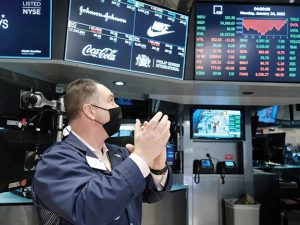Bloomberg
US equity futures were mixed and bonds gained on Thursday as traders weighed Federal Reserve minutes that struck a less hawkish note with downbeat remarks on China’s economy by Premier Li Keqiang.
Contracts on the Nasdaq 100 and S&P 500 fluctuated amid mixed corporate news. Nvidia Corp. fell more than 5% in premarket trading as China’s Covid-19 lockdowns and the war in Ukraine weighed on the chipmaker’s sales forecast. Apple Inc dropped after a report said that the tech giant is planning to keep iPhone production roughly flat in 2022. Twitter Inc rises after billionaire Elon Musk modified the financing for his bid to purchase the social-media platform.
The Stoxx Europe 600 index posted a modest gain. Energy shares were among the best performing as oil climbed amid data that showed further decrease in US crude and gasoline stockpiles ahead of the summer driving season. Mining shares slid alongside iron ore and most base metals, while technology shares underperfomed.
Treasury yields and the dollar slipped. Fed policy makers indicated their aggressive set of moves could leave them with flexibility to shift gears later if needed.
Investors took some comfort from the Fed minutes that didn’t show an even more aggressive path being mapped to tackle elevated prices, though central banks remain steadfast in their resolve to douse inflation. Still, volatility has spiked as the risk of a US recession, the impact from China’s lockdowns and the war in Ukraine simmer.
“We expect key market drivers to continue to be centered around inflation and how central banks react; global growth concerns and how China gets to grip with its zero-Covid policy; and the geopolitical conflict between Russia and Ukraine,†said Fraser Lundie, head of fixed income for public markets at Federated Hermes Limited. “Positive news flow on any of these market drivers could sharply improve risk sentiment; however, there is a broad range of scenarios that could play out in the meantime.â€
It’s time to buy the dip in stocks after a steep global selloff in equity markets, according to strategists at Citigroup Inc. Meanwhile, Fidelity International CEO Anne Richards said the risk of a recession has increased and markets are likely to remain volatile, the latest dire warning on the outlook at the World Economic Forum.
“If inflation gets tame enough over summer, there may not be continued raising of rates,†Carol Pepper, Pepper International chief executive officer, said on Bloomberg TV, adding that investors should look to buy tech stocks after the selloff. “Stagflation, I just don’t think that’s going to happen anymore. I think we are going to be in a situation where inflation will start tapering down and then we will start going into a more normalised market.â€
Most US policy makers saw half-point rate increases as appropriate at the next two meetings. While they noted the potential for rates to go high enough to constrain the economy, there were hints of a possible pause — an “expedited†tightening would leave the Fed “well positioned later this year to assess the effects of policy firming and the extent to which economic developments warranted policy adjustments.â€
Markets continued to show traders pricing in 100 basis points of rate hikes over the next two meetings.
Russia’s central bank delivered its third interest-rate reduction in just over a month and said borrowing costs can fall further still, as it looks to stem a rally in the ruble.
The Bank of Korea raised its key interest rate on Thursday Governor Rhee Chang-yong demonstrated his intention to tackle inflation at his first policy meeting since taking the helm. New Zealand’s central bank has also shown its commitment this week to combat surging prices.
 The Gulf Time Newspaper One of the finest business newspapers in the UAE brought to you by our professional writers and editors.
The Gulf Time Newspaper One of the finest business newspapers in the UAE brought to you by our professional writers and editors.
